Nicole Cooke
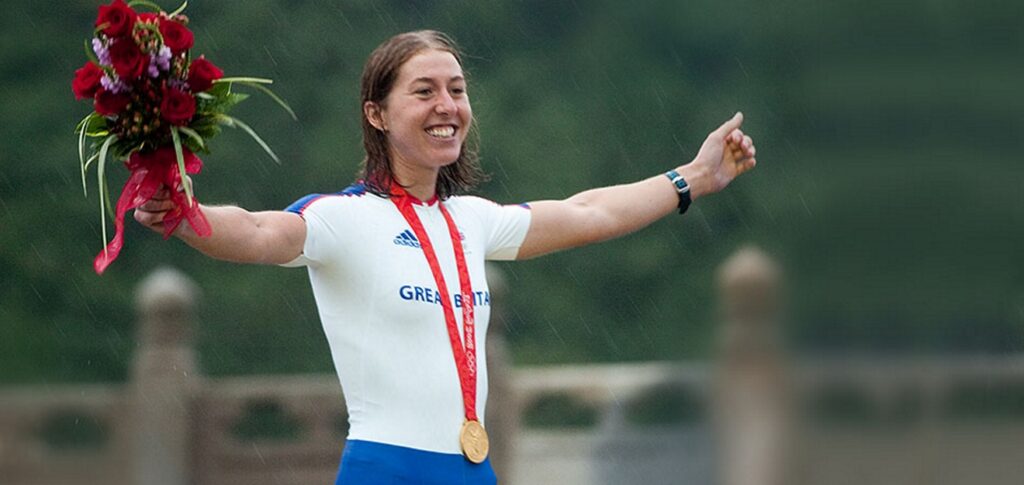
NICOLE COOKE is one of life’s natural-born winners who became the dominant rider in British women’s cycling for more than a decade and one of the greatest in the world at the peak of her powers.
Cooke earned a reputation as a fierce competitor and great all-rounder, triumphing in the one-day Classics as well as Grand Tours, and took that same fire and determination into her wider life, speaking out against drugs, sexism and exploitation in her mission to improve women’s cycling.
She gave an early sign of her all-round ability by become a multi junior world champion. She won four Junior World titles – the Road Race in 2000 in France and the unique treble of Mountain Bike in Colorado, USA, Time Trial and Road Race in Portugal in 2001.
All this came after she had won the first of her 10 British Road Race titles in 1999 at the age of 16. Not a bad start to a career on a bike that got off to a shaky start when she refused to ride her first bicycle with stabilisers and had her first major cycling injury aged seven, when she fell off and fractured her skull.
Her father, a physics teacher, was a competitive cyclist in his youth and his daughter would race him twice daily on the cycle ride to and from school.
Cooke turned professional for the Spanish-Ukrainian Deia-Pragma-Colnago team at the start of the 2002 season.
She struck gold for Wales at the 2002 Commonwealth Games in Manchester in the Road Race and in 2004 she became the youngest winner, and the first British cyclist, male or female, to win a Grand Tour when she triumphed in the Giro d’Italia Femminile. A fall in the road race in Athens meant she could only finish fifth at the 2004 Olympic Games.
With a trailblazing approach to racing, Cooke set new records at every stage of her career on her way to becoming world number one in 2007.
In addition to Olympic and World gold, she won 10 national titles, two Tour de France, the Giro and two World Cup Series on a long list of career successes.
Those include La Flèche Wallonne Féminine (2003, 2005, 2006), Amstel Gold Race (2003), GP Castilla y Leon (2006), Geelong World Cup (2007), Tour of Flanders for Women (2007) and the GP de Plouay (2003).
Her greatest year was in 2008 when she struck gold at the Olympic Games in Beijing and then followed that up six weeks later by winning the World Road Race Championships in Varese as well – the first woman to achieve such a double.
She earned her Olympic gold the hard way, dropping off the leading pack of four riders in the final mile of a three and a half hour race before clawing her way back to the head of the field.
Drawing on every element of tactical precision and physical strength at her disposal, Cooke hit the front with 200 metres to go in an uphill climb in very wet conditions to take the title.
It was Britain’s first gold medal in Beijing, the first in the road race by a British rider and the 200th gold for Great Britain in the modern Olympic Games.
She was second at the 2005 World Road Race championships and third the next year. She won a bronze medal for Wales at the 2006 Commonwealth Games and went to her third Olympic Games in London in 2012.
On their website, cyclinguk.com paid this tribute: “Nicole is one of the greatest female road cycling champions Britain has ever produced but, more than that, she has changed the face of her sport for the better, leaving it in a far better place than when she entered it.”
Cooke finished her racing career aged 29 after the London Olympics in 2012 and took the opportunity of her retirement to tackle the challenges the sport faced and her hopes for the future.
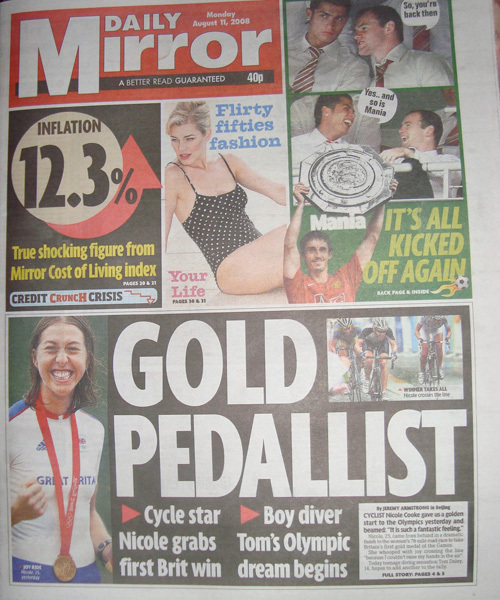
In an honest and candid address, Cooke gave a 20-minute speech to stunned silence by journalists in which she exposed the darker sides of the sport. This caused Forbes to title their article “The Anti-Lance Armstrong”.
One of her legacies was to get British Cycling to stage under-16 girls track championships, in parity with the boys. After British Cycling initially refused, Cooke used her determination to get them to change their minds.
Cooke said: “Now the track championships are a huge success and a key milestone for riders aspiring to make the Olympic track cycling team and I’ve very proud of having been able to contribute to such a change”.
Among her initiatives, she wrote personally to the UCI president in 2005 asking for equality of cycling events for women at the Olympics, and to the World Anti-Doping Agency to highlight riders’ abuse of performance-enhancing drugs and the loosening of anti-doping rules to allow previously banned products to be legal.
In 2017, Cooke was a witness at the Department of Culture Media and Sport’s Select Committee into Doping and Corruption in Cycling, and continued to campaign for a minimum wage for female road riders.
The Independent stated: “Former Olympic and world champion cyclist Nicole Cooke has issued a damning attack on British Cycling and Team Sky, condemning the governing bodies for their lack of accountability, sexism, and failure to fight the abuse of performance-enhancing drugs within the sport”.
Her autobiography, The Breakaway, was published in the summer of 2014. The Guardian‘s Richard Williams described it as “a compelling and salutary account of the price she paid for the victories, from which many others will benefit”.
Cooke was born in Swansea on April 13, 1983, and grew up in Wick, Vale of Glamorgan. She attended Brynteg Comprehensive School in Bridgend. She began cycling at 11, starting at Cardiff Ajax Cycling Club of which she is a life member.
She was soon competing in all disciplines, from mountain biking to track, hill climbs to cyclo-cross, to take advantage of all racing opportunities.
With dreams to one day ride the Tour de France, Cooke trained with determination, fitting in as many hills as possible to any ride including the daily cycle to school.
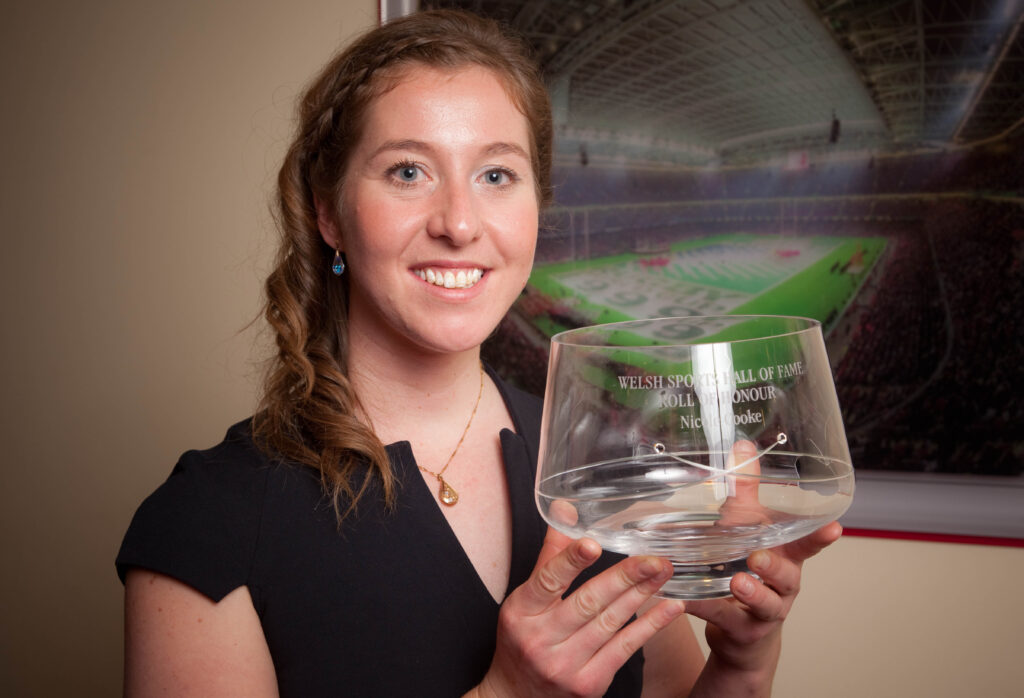
At 16 she won her first senior national title, becoming the youngest rider to take the senior women’s title at the 1999 British National Road Race Championships. At 17 she became the youngest rider to win the senior women’s title at the 2001 British National Cyclocross Championships. Later that year Cooke won her second senior women’s title at the 2001 British National Road Race Championships.
Winning four UCI World Championship Junior titles at the start of the new millennium, Cooke’s achievement was recognised with the award of the 2001 Bidlake Memorial Prize for outstanding performance or contribution to British cycling.
At 16, Cooke was able to compete in the 1999 Elite British Road Race Championships due to the situation of there being no Junior (under-18), or Youth (under-16) British Road Race Championships for women at the time.
The race became a dual between Yvonne McGregor, a former world hour record holder, and Nicole, with the pair locked in a breakaway together for over 60 kilometres. While Yvonne tried to draw on her endurance to wear Nicole down, Nicole was able to respond to each attack and eventually sprinted to victory and her first British Road Race title.
Curiously, shortly after that British Road Race Championship a new rule was created by the UCI stating that competitors in the Olympic Road Race needed to be 19 years of age, which happened to rule the Welsh rider out of competing in the Sydney Olympics.
In 2000 Nicole made her international debut. Still a junior, Nicole raced at the Grand Prix de Quebec stage race where she would be up against the reigning Olympic Road Race Champion from the Atlanta Olympics, France’s Jeannie Longo.
On the toughest mountain stage Cooke was in the leading group of five riders and finished in second place, beating Jeannie on her preferred terrain, and scored another two podium finishes to finish in fifth place overall.
Looking forward to turning professional, Cooke chose to focus on road racing where her passion for the tactical element of racing combined with the challenge of the demanding physical requirements of speed and endurance would put her to the ultimate test.
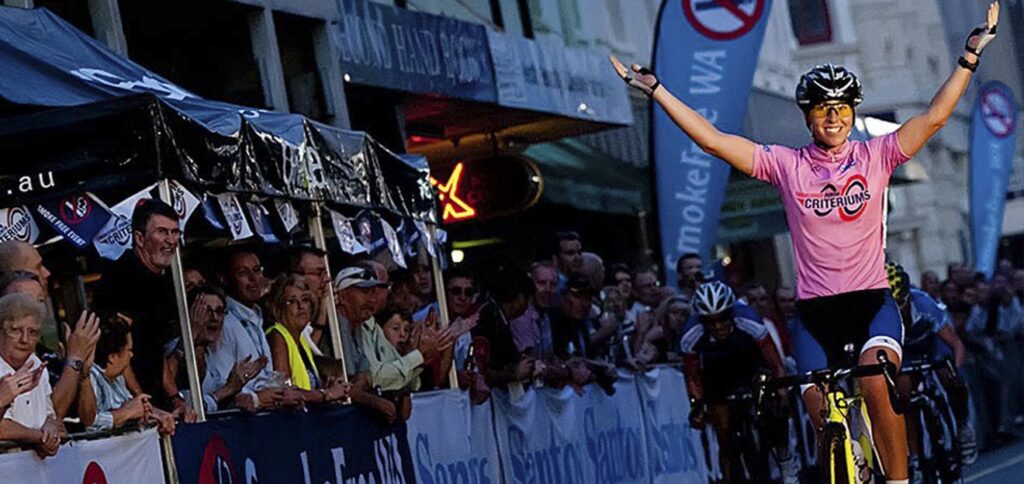
She moved to Italy at 18 and embarked on her first full racing season. Cooke’s attacking style and tactical skills served her well, winning gold in the Commonwealth Games Road Race in 2002, becoming the youngest winner of the World Cup Series in 2003 including four World Cup wins in a row, The Amstel Gold Race, Fleche Wallone, GP Montreal and GP Plouay, and finished the 2003 season by winning bronze at the World Championship Road Race in Hamilton, Canada.
In 2004, Cooke raced her first Grand Tour, the Giro d’Italia. It was the only race her Acca Due O team had not won, and for an Italian team this race held a special place in their hearts.
As expected, the decisive stage was the mountain-top finish to the Madonna del Ghisallo – a head-to-head dual between four-time Giro d’Italia winner and three-time Tour de France champion Fabiana and Cooke, just a few seconds splitting the two riders in the General Classification.
With 1.5km to go Cooke launched her attack as the gradient steepened, breaking away with a small lead on the chasers. Eventually Fabiana wilted and Cooke rode to a solo stage victory and into the Maglia Rosa.
At 21, Cooke became the youngest winner of the Giro d’Italia, and it was also the fastest edition of the race on record. After the race finish in Milan, the Acca Due O team was welcomed back to their home base in Treviso with a huge celebration as sponsors, town mayors, friends and family of the team put on a party to celebrate their Giro success.
A few weeks later Cooke represented Great Britain at the Olympic Games in Athens finishing fifth to Sara Carrigan of Australia. It was a huge disappointment at the time, but a valuable learning experience.
2005 saw more World Cup victories and another World Championship medal, a silver in Madrid, Spain, for the rider dubbed ‘The Wick Wonder’ in Welsh circles.
In early 2006, as Cooke was preparing to defend her Commonwealth Games Road Race title in Melbourne, Australia, the Welsh Cycling Union (WCU) had the idea to put their focus on the men’s event, sending a full team of six for the men’s road race, and Cooke as the sole Welsh rider for the women’s event.
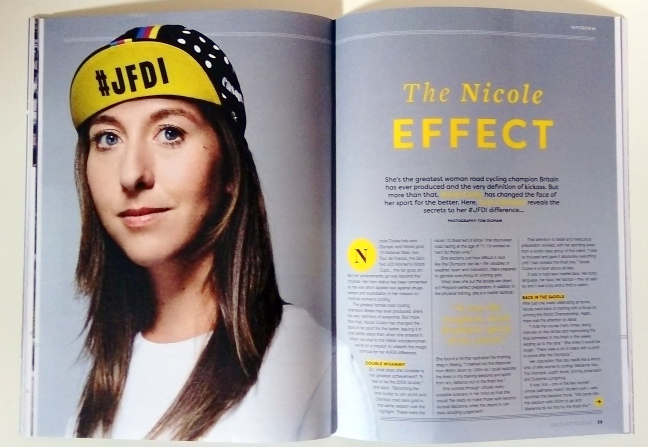
It made for a fairly one-sided race, Team Australia dominating the race to win gold and silver, and Cooke’s bronze medal was “as good as gold” for her in the circumstances. In her autobiography Cooke wrote “By their decision, the WCU had gifted Australia, Canada, England and New Zealand my head on a plate”. None of the six Welsh men completed the men’s race.
She would later cite this as an example of the sexist attitudes of the sport she encountered throughout her career in an article entitled ‘Welcome to the world of elite cycling where sexism is by design’.
Back in Europe and supported by her new Swiss-based Univega Team, Cooke won three World Cup rounds and the World Cup Series overall.
That summer, Cooke became the first Briton to win the Tour de France, riding in yellow, alone, over the summit of Mont Ventoux, and going on to win the stage and clinch her first Tour de France victory.
At the 2006 World Championships in Salzburg, Austria, Cooke won bronze and finished the season as world number one, also leading her Univega Team to top spot in the world team rankings.
2007 started well, with victory in the Geelong World Cup and Tour of Flanders World Cup and a successful defence of the Tour de France, this time with a tactical ride to defend her yellow jersey against multiple attacks on the final stage.
Unfortunately, Cooke’s season was cut short by a knee injury and after leading the World Cup series from the first round, Nicole lost the series lead at the very last round.
She began 2008 as one of the favourites for the Olympic Road Race on paper, but had a difficult start to the season with the knee injury continuing to hold her back for most of the winter.
Cooke gradually built up towards the Olympics, honing her preparation on training courses at home that recreated the same challenges she would face in Beijing. On the start line in central Beijing, heavy rain had already caused some parts of the course to flood, and at 136km this was going to the longest of any women’s competition at the Beijing Olympic Games.
Cooke’s Olympic gold medal was the first by a Welsh athlete in 36 years, and the first Olympic gold medal won by a Welsh woman. The Sports Writers Association recognised this ride as the Outstanding Performance of the Year, 2008, and ESPN named Nicole their 2008 Female Athlete of the Year.
In the 2009 New Year’s Honours Cooke was awarded the Member of the Order of the British Empire (MBE) for services to sport.
Six weeks later Cooke completed that unique double, winning the World Road Race Championships in Varese, Italy, to become the first rider in history to win the Olympic and World Championship road race in the same year.
In 2009, resplendant in the famous rainbow jersey as world champion, Cooke achieved victories in Spain and Italy, and added the Giro di Trentino to her palmares.
Cooke treated her home Welsh fans to a great display of racing to win the British Road Race Championship in Abergavenny, her 10th British Elite Road Race title.
At the 2010 World Championships, Cooke was in a breakaway coming into the finish with the chasing pack within touching distance. As she launched her sprint to the line and took the lead, riders from the chasing group caught and passed her metres before the finish line, leaving her just outside the medals in fourth place.
A year later, it was fourth again at the 2011 World Championships, this time in a bunch sprint. At the London 2012 Olympic Games Lizzie Armitstead won the silver medal for Great Britain in the Road Race, with Cooke finishing in the main group.
After retiring following a glittering career, she continued to be a winner, her book, The Breakaway, being named The Sunday Times sportsbook of the year and Sweetspot cycling book of the year in 2014. It was also a finalist for the William Hill sportsbook of the year and the British Sport Book Awards.
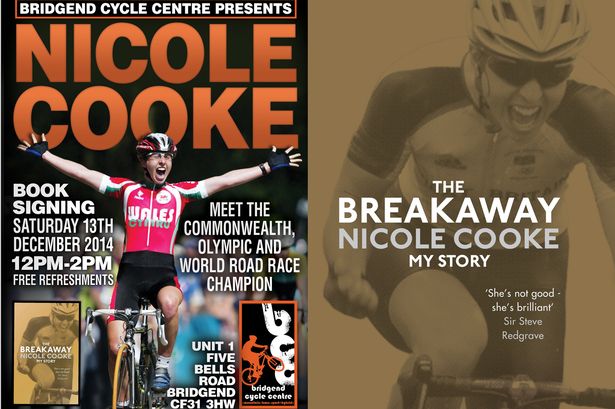
As well as her autobiography, Cooke wrote Cycle for Life (2008), a guidebook for people new to cycling, covering bike set-up, introducing training programmes and explaining racing tactics.
She was named Welsh Sports Personality of the Year in 2003 and inducted into the Welsh Sports Hall of Fame in 2013.
BACK TO HOME PAGE